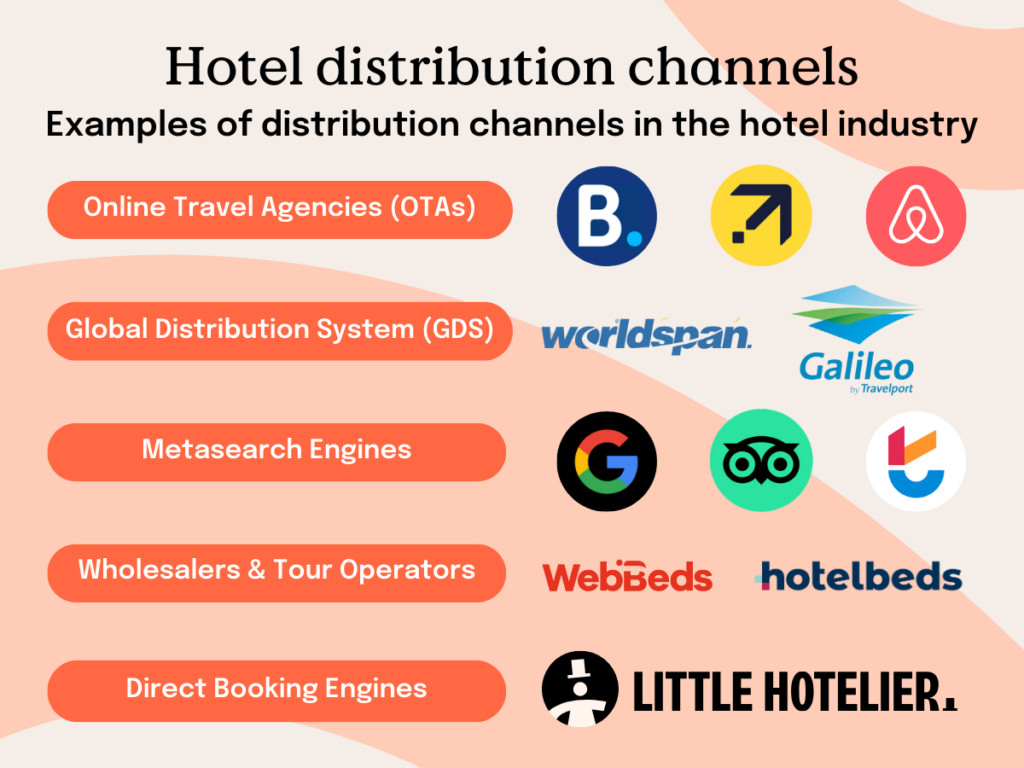What are hotel distribution channels?
Hotel distribution channels are the places that accommodation providers can sell rooms to guests. Hotel distribution channel examples include online travel agencies (OTAs) like Expedia and Booking.com, global distribution systems (GDS), metasearch engines and direct bookings made through hotel websites, or over phone and email.
All-in-one software to rule them all
Managing multiple hotel distribution channels can be frustrating sometimes, but with our single-login platform, you can easily broaden your reach and win more bookings.
Learn moreWhat is the importance of distribution channels in the hotel industry?
The importance of distribution channels in the hotel industry should be obvious at a glance – they are where your bookings come from, so without distribution channels your hotel would be empty.
The importance of these booking channels, particularly for small, independent hoteliers, is in the way they level the playing field. The internet allows your small hotel to compete with the world’s largest chains, whether on OTAs, through GDSs or via your own website.
It’s not a matter of whether you use hotel distribution channels, but how you use them. Hotel distribution channel strategy is an art: you want to ensure your guests can book where, when and how they want, but you can’t simply offer all the booking channels, as managing them would be too much work (though the right technology can help).
A wiser strategy is to choose a selection of distribution channels that will maximise your hotel’s visibility, reach, and revenue.
Hotel distribution channels examples
Which channels might make up your ideal mix? To find out, let’s take a look at the most popular distribution channels for the hotel industry.
Online Travel Agencies (OTAs)
The likes of Booking.com and Expedia offer an almost complete selection of hotels in any given area, and allow users to directly compare all of their options, which is why they are so popular. OTAs form an integral part of almost all hotel distribution channel strategies, though it should be noted that these partnerships come at a price: most OTAs charge a commission of 15%-25% on every booking.
Global Distribution Systems (GDS)
By offering your hotel through a global distribution system like Amadeus or Sabre, you make it available to travel agents looking for accommodation for their clients. These systems offer up-to-date pricing and availability information to travel agencies around the world. While commission fees can be slightly lower than OTAs, most GDSs still charge 10%-15% on each booking.
Metasearch Engines
Metasearch engines like Kayak, Trivago and Google Hotels are the ultimate collectors of hotel booking options. They pull real-time information from OTAs and direct booking channels, then show users all the available hotel options, from all the different booking channels at all the different prices. If a guest wants to book a room, the metasearch engine redirects them to the chosen site. Your hotel can be displayed through your own metasearch listing or on an OTA-linked listing.
Direct Booking Channels
By far the most valuable distribution channel for any hotel, direct bookings see a guest dealing directly with you, which means you avoid paying commission fees. These bookings might come through your website (if it’s fitted with a direct booking engine), on email or over the phone.
Vacation Rental Platforms
A type of OTA, the likes of Airbnb and Vrbo have carved out a niche in the market by offering unique, boutique and more personal stays. Multinational hotel chains usually aren’t allowed on these platforms, so they can be a great source of bookings for small, independent hotels.
Wholesalers and Tour Operators
While global distribution systems connect your hotel with travel agents, hoteliers might consider building partnerships with other travel businesses, such as wholesalers and tour operators. In the case of tour companies, this can turn into a ‘you scratch my back, I’ll scratch yours’ situation, where businesses offer up guests to one another, and both benefit.

How to build a hotel distribution channel strategy
- Define your target audience
Before you form your distribution strategy, you need to understand who you’re aiming to distribute to. Consider who your ideal customer is, and create buyer personas to gain a clearer picture of these individuals.
- Research distribution channels
Ask yourself: which hotel booking channels does your ideal customer use? What are the pros and cons of each channel?
- Compare metrics across channels
Armed with a list of potential channels, dig into the numbers. Investigate visitor numbers, conversion rates, user demographics and commission fees to identify the best options.
- Implement channel management tools
Once you have a presence across a suite of booking channels, use a channel manager to manage your listings more efficiently and effectively. The right solution can save you a lot of time – up to 35 minutes per booking with Little Hotelier!
- Monitor and adjust
Keep track of how well each channel performs: views earned, bookings made, revenue generated, etc. If a certain distribution channel isn’t performing, try to improve how you use it. If it still doesn’t generate revenue, consider removing or replacing it.
How to connect with hotel distribution channels for independent properties
How you connect with a hotel distribution channel will depend on the channel that you’re attempting to connect with:
- OTAs/vacation rental platforms/metasearch engines: Navigate to your chosen platform or site, and sign up directly with it. By creating a Booking.com or Expedia listing you’ll automatically get listed across all of their OTA sites.
- GDSs: Independent hotels can only connect to a GDS via a travel technology/connectivity provider like D-EDGE and Reconline.
- Direct bookings: Set up a direct booking engine on your site.
- Wholesalers/tour operators: Make direct contact with potential partners.
By Dean Elphick
Dean is the Senior Content Marketing Specialist of Little Hotelier, the all-in-one software solution purpose-built to make the lives of small accommodation providers easier. Dean has made writing and creating content his passion for the entirety of his professional life, which includes more than six years at Little Hotelier. Through content, Dean aims to provide education, inspiration, assistance, and, ultimately, value for small accommodation businesses looking to improve the way they run their operations (and live their life).
Table of contents
“My experience with Little Hotelier has been fantastic due to the ability of managing all channels in one place. It made my business more professional.”
Owner, Forgandenny House B&B








